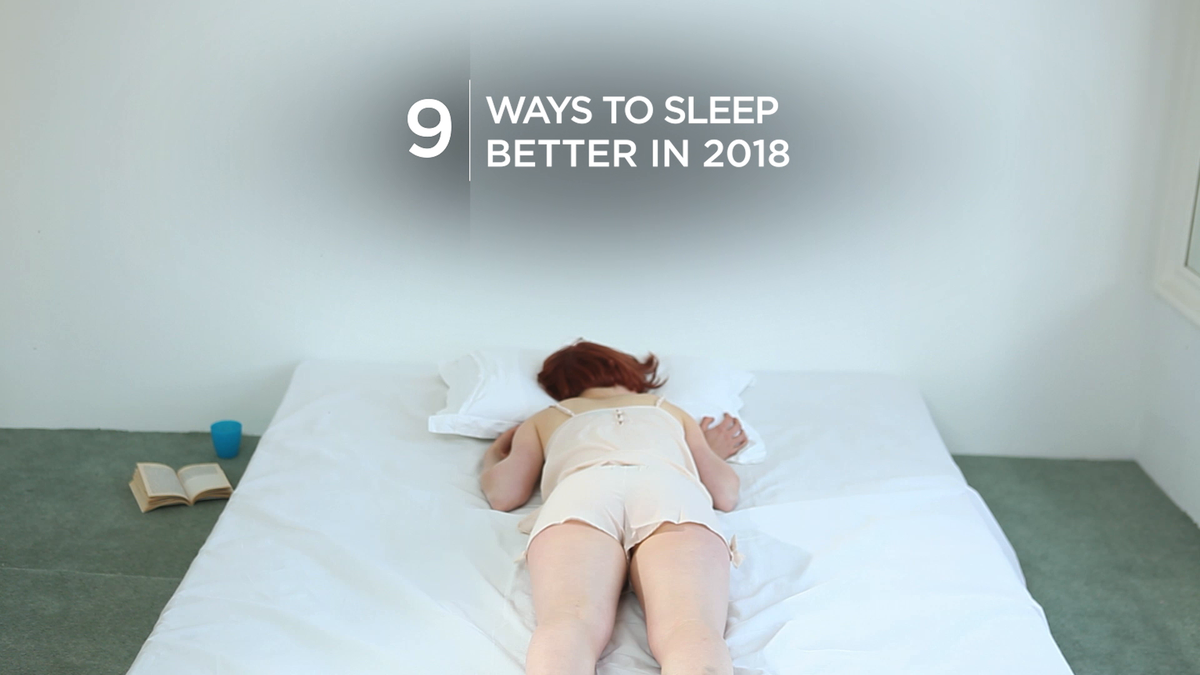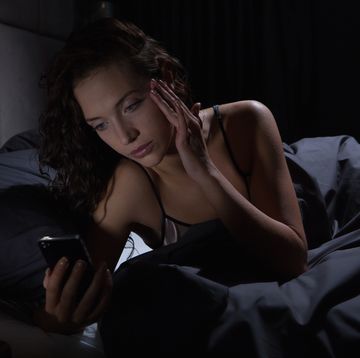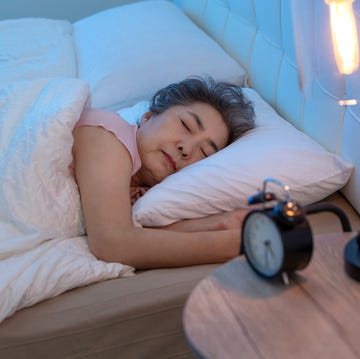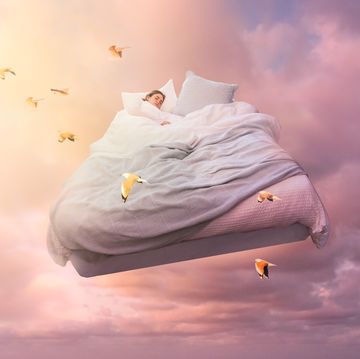Imagine waking up early one morning. You’re able to see and hear everything around you and you can breathe just fine—but you can’t move. At all. Your limbs are frozen, your head is heavy, and you can't even wiggle your toes. A couple minutes pass, and as just as you feel like you're going to lose your mind, you regain control of your body.
Sounds kind of terrifying, right? That’s how it feels to be in sleep paralysis, a condition that makes it temporarily impossible to move or speak when falling asleep or waking up. If these symptoms sound familiar, you're in good company; it's estimated that up to 50 percent of adults experience sleep paralysis at least once in a lifetime.
Why does sleep paralysis happen?
Skimping on shuteye—which about 35 percent of Americans do regularly—is one big risk factor for sleep paralysis. “When we look at people who are sleep deprived, those are the populations who tend to get this,” says Michael Breus, PhD, founder of thesleepdoctor.com. Students, psychiatric patients on meds that mess with their sleep quality, or even new moms could be more susceptible to the condition. The most common group to experience sleep paralysis, though, is people with narcolepsy, a disorder causing extreme tiredness.
What exactly happens during sleep paralysis?
There are three kinds of muscles in the human body, says Gary Zammit, PhD, executive director of the Sleep Disorders Institute: cardiac muscle, or your heart; smooth muscle, which occurs in your internal organs and works without your voluntary control; and skeletal muscle, which moves your limbs and other parts of your body. In an episode of sleep paralysis, your cardiac and smooth muscles work just fine—so internally, your body's humming along like normal—but you lose control of your skeletal muscle.
While you might wake up feeling physically paralyzed at any time of night, it’ll likely happen just before you get up in the a.m. That’s when you’re typically in REM sleep or the third sleep stage (the one in which you’re dreaming), says Breus. “During our REM sleep the body is paralyzed, so we don’t act out our dreams. Otherwise, we’d be all over the place,” he explains. “In the issue of sleep paralysis, you’re in REM sleep, and while the brain wakes up, the body is still in paralysis.”
What is a sleep paralysis demon?
"Sleep paralysis demon" is a common nickname for the vivid, terrifying hallucinations some people experience during sleep paralysis. They can occur either when falling asleep (hypnagogic) or waking up (hypnopompic). These episodes vary from person to person, but common hallucinations include the sensation of someone watching you, being dragged out of bed, or a sinister being sitting on your chest. If you've experienced hallucinations like these, it doesn't make your case of sleep paralysis more serious—just a hell of a lot scarier.
How long does sleep paralysis last?
Even if frightening, this frozen feeling will only last about 15 seconds to a couple minutes. So try not to panic. “The more anxious you get, the longer it will feel like it lasts,” Breus says. “If you’re breathing and you can blink, you’re not permanently paralyzed. It likely just means you need to get more sleep.” Convinced to get to bed early tonight?
Is sleep paralysis serious? Can you die from sleep paralysis?
Lots of times, an episode of sleep paralysis will occur as a one-off, say if you pulled a few all-nighters or haven’t been getting quality zzzs for multiple nights in a row. It’s not necessarily dangerous or something you need to be super concerned about. But you do want to see someone—a neurologist or sleep specialist—if you experience it more than once every two weeks, Breus says. While there’s no official test to diagnosis it, a doc can help you pinpoint what happened through an interview. Better sleep and more time spent resting will treat episodes of sleep paralysis best, but some patients also take tricyclic antidepressants.
Keep sleep paralysis in mind if you have kids who aren’t sleeping, too. Narcolepsy doesn’t often show up until the teenage years, Breus says, so you’ll want to get your child checked out if they report this feeling.
Finally, if you happen to share a bed with someone experiencing a bout of sleep paralysis, Dr. Zammit says people report snapping out of it if someone else touches them. Try to save your S.O. from a scary moment by giving them a hand and breaking the spell.
Mallory Creveling, an ACE-certified personal trainer and RRCA-certified run coach, joined the Runner's World and Bicycling team in August 2021. She has more than a decade of experience covering fitness, health, and nutrition. As a freelance writer, her work appeared in Women's Health, Self, Men's Journal, Reader's Digest, and more. She has also held staff editorial positions at Family Circle and Shape magazines, as well as DailyBurn.com. A former New Yorker/Brooklynite, she's now based in Easton, PA.













